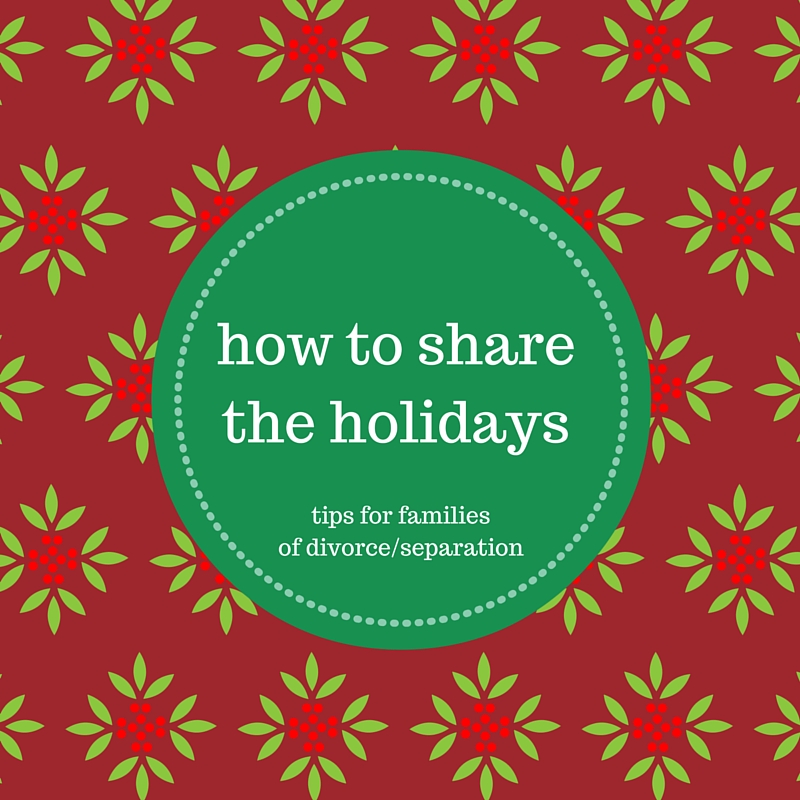I am not a child of divorce, but my son is. This is a lifestyle that has become new and unfamiliar to me. Heartbreaking at times. It has its moments. I am learning as the years go by. It’s not the life I would have wished for my child to experience, but it is the life I chose for him, for us. We persevere. We share the holidays.
For my son, this is all he knows. His parents were divorced when he was an infant. So he has always had two families; it’s what he knows and it’s all he remembers. So as the temperature drops and I begin hear the jingle of the music, I anticipate the reminder of what his life is now: separate celebrations with his two families. Being without my sweet boy during times when that’s all we should be doing is difficult. I prepare to feel the internalized emotions that come along for the ride that accompany this latter part of the year. Holidays are spent every other year with my side, and the years in between with his dad’s side.
As my son will be turning 5 in January, we have had our handful of separated holiday experiences and recognize each as a learning opportunity basked in love. Accepting the situation for what it is, and being thankful with every return. I’ve gathered a few tips I’ve learned along the way that I hope speaks to others who experience the holiday time in a similar fashion.
1. Build it up for the kids.
Children are intuitive. They pick up on how you feel, and they definitely pick up on and are influenced by what you say and how you act. As challenging as it can be to excite yourself for your child spending time with the other parent, it is an essential component for a healthy transition for your child. When you show positive regard for the events that are about to take place, it will alleviate the child from harboring negative emotions in response to you, and in response to something that might be out of their control, like how they will be spending their holiday or whose house they will be waking up at on Christmas morning. The child may or may not want to spend that time apart from whoever the caretakers are—I argue that both possibilities can be just as difficult for the parent. So, keep in mind that positivity and excitement take effort from the parents but go a long way for the kid. Santa is coming to your dad’s house this year!/ You will get to play with all your fun toys at your mom’s house!/ It’s going to be fun to play with your cousins!
2. Enjoy the time to yourself.
Sometimes it’s weird to think about the fact that you are a person outside of being a mom. Naturally as we become moms, motherhood instantly fuses with our identity. Who are we without our children, right? Separated time from your child/children might be an outlet or opportunity to figure that out. I encourage you to do something you enjoy but don’t usually have the time to do—from reading a book to sleeping in to taking a trip. If you’re anything like me, being defused from your child during visitations paves the way for self-pity and wallowing in guilt, while easily giving into catastrophic thinking that the possibility of my child having a “normal” life is now impossible because he is a child of divorce. Having a plan of things to do for yourself, even if it’s just time being spent alone to relax, makes it pretty incompatible to engage in my go-to pity party for longer than I really need to. I can and will enjoy coming up for air.
3. Ensure safety and stability.
Children want and need love and safety to thrive. What is it that soothes your child? If they are a worrier, maybe it’s a plan. Could be a special toy, blanket, or even a photo? If they are more carefree, maybe it’s not that much as they can adapt and go with the flow. Children sometimes transition better when there is an expectation established. For young ones, knowing what to expect can be helpful—like how many nights they will be sleeping over, or what day they can expect to get picked up, or what the plans are for when they go. Decorating a Christmas tree, a trip to the zoo lights holiday show, a big family dinner. Ask what the plans are ahead of time, and share them with your child. Any of these plans can be made into a conversation with your child as preparation for the transition, and it is an opportunity to openly communicate about the situation about to take place.
4. Use your child’s language.
Children are curious. They might ask questions. Answer honestly and genuinely, and if possible, use their language so that they can understand to the extent of what they can developmentally. Validate their feelings if they can express them. Explain what divorce or separation is objectively and without bias if the conversation goes there, and make it an open and welcomed topic. Meet their needs by answering their questions directly. Give them permission to enjoy life when you aren’t present, as they might be concerned about you while they are gone.
5. Keep the traditions and routines.
The Elf on the Shelf could make the trip. The Advent calendar could hang on the other refrigerator. Perhaps the little nativity set he/she likes to play with at your home can sit on the night stand at the other house. Familiarity goes along way—much like the expectations. Consistency of the child’s story or meaning-making of holidays is helpful regardless of the sheer fact that these experiences in two homes might be much different.
6. Compromise for the child/children.
Holiday visitations might be a little different than other visitations—perhaps with a lengthier stay or varying schedule. Adjustments take place. Do what you can to accommodate when necessary. As previously mentioned, children are intuitive, and being around separated parents who can agree about plans goes a long way.
7. Remind yourself that children are resilient.
Children learn to adapt a lot easier than adults can. They don’t have much choice in their life at young ages, so they are moreso forced into situations but have the ability make the most out of them by figuring out how to have fun. Keep this resiliency in mind! Children can and will survive and thrive with love, support, and safety. They can define their own Christmas magic when given these essentials.

















